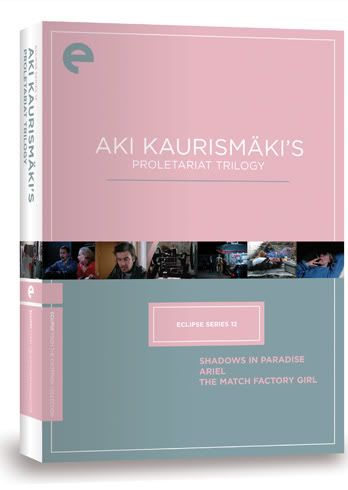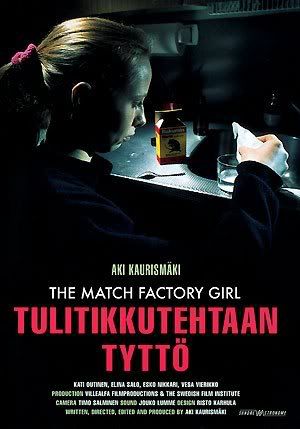By Dan Callahan So, a “proletariat trilogy” from the eighties by a Finnish director? It doesn’t sound too delightful, does it? But the three Aki Kaurismäki films collected in this Criterion release from their Eclipse line are delightful, on some level. They all involve people who work at low-level jobs: garbage-men, factory workers of all kinds, shop girls. In the second film, Ariel (1988), the heroine (Susanna Haavisto) begins as a meter maid giving out tickets, then progresses to jobs where she always seems to be cutting up disgustingly large sides of beef. Yet these movies don’t feel like drudgery, maybe because they aren’t in any way realistic; they take place in a tightly controlled world of their own. I’ve never been to Finland, but I’d be surprised to find even a vestige of Kaurismäki’s grim, deadpan cuteness.
So, a “proletariat trilogy” from the eighties by a Finnish director? It doesn’t sound too delightful, does it? But the three Aki Kaurismäki films collected in this Criterion release from their Eclipse line are delightful, on some level. They all involve people who work at low-level jobs: garbage-men, factory workers of all kinds, shop girls. In the second film, Ariel (1988), the heroine (Susanna Haavisto) begins as a meter maid giving out tickets, then progresses to jobs where she always seems to be cutting up disgustingly large sides of beef. Yet these movies don’t feel like drudgery, maybe because they aren’t in any way realistic; they take place in a tightly controlled world of their own. I’ve never been to Finland, but I’d be surprised to find even a vestige of Kaurismäki’s grim, deadpan cuteness.
These three films are unusual in several ways. Notably, they all run around an hour and ten minutes, as if Kaurismäki knew that a little of his particular sensibility went a long way. They all use music inventively, either to provide emotion where there is none, or to act as counterpoint to the comically drab lives of the protagonists. The funniest thing about the first film, Shadows in Paradise (1986), is the title: Kaurismäki’s vision of the Finnish city Helsinki is about as far from paradise as you can get, and you can’t imagine anything in this city that could cause a shadow, either physically or psychically.
There never seems to be anybody on the pleasantly lonely streets of Shadows in Paradise, and there’s no street noise, either; as garbage men go to work in the film’s first shots, none of them says a word to each other. When one of the garbage men, Nikander (Matti Pellonpää) takes his girl Illona (Kati Outinen) to a restaurant, the maître d' tells them that it’s full (earlier in the film, Ilona asks for a hotel room, and has to wait quite a while to find out that it’s full, too). Kaurismäki’s comic timing is slightly off in these scenes, but Outinen lands a huge laugh when she defends Nikander to a girl she works with, then languidly runs down the guys this girl goes out with. Outinen gets the laugh by effecting an “I couldn’t care less, but why not keep going?” mood, and Kaurismäki is smart enough to keep the camera on her as she does this. The resolution of the slight story in Shadows in Paradise is fun, but it has a whiff of wish fulfillment, and this wish fulfillment takes over in Ariel, the weakest of the three films. It begins again with men going to work, this time in a mine, and it quickly sketches in another droll love story. There is a very funny series of scenes set in an eerily genteel flophouse, a place where men put up framed photos and silently read their papers, but Ariel flounders when it takes up a crime plot that concludes in an absurdly unconvincing prison escape. Kaurismäki’s distinctive brand of unreality can’t handle the mechanics of a standard story like this. A stay in prison isn’t at all different in Ariel from life on the outside, but this joke isn’t particularly pointed; what’s needed is a touch more outrage, a bit of wildness. As it is, the film just dribbles nicely along to a silly conclusion scored to a Finnish version of “Over the Rainbow.”
The resolution of the slight story in Shadows in Paradise is fun, but it has a whiff of wish fulfillment, and this wish fulfillment takes over in Ariel, the weakest of the three films. It begins again with men going to work, this time in a mine, and it quickly sketches in another droll love story. There is a very funny series of scenes set in an eerily genteel flophouse, a place where men put up framed photos and silently read their papers, but Ariel flounders when it takes up a crime plot that concludes in an absurdly unconvincing prison escape. Kaurismäki’s distinctive brand of unreality can’t handle the mechanics of a standard story like this. A stay in prison isn’t at all different in Ariel from life on the outside, but this joke isn’t particularly pointed; what’s needed is a touch more outrage, a bit of wildness. As it is, the film just dribbles nicely along to a silly conclusion scored to a Finnish version of “Over the Rainbow.”
But the third film in the set, The Match Factory Girl (1990), is a small masterpiece where Kaurismäki hones a savage story to such a fine edge that it wouldn’t be embarrassing to compare it to the best of Bresson. At its center is Kati Outinen, who played the girlfriend in Shadows in Paradise. Here she plays Iris, a sullen girl who works in a factory and lives at home with her mother and stepfather. We see her cooking a homely meal for them; afterwards, Kaurismäki juxtaposes TV coverage of the massacre in Tiananmen Square with Iris making herself up to go out dancing. When he cuts to a kitschy, time-warp sort of dance hall, the contrast with the violence we’ve just seen on television is shocking, and funny, too; it signals that The Match Factory Girl is going to be in a much darker key than the first two films. Iris just sits by herself at the dance hall, sipping an orange drink. Finishing it, she puts it down next to a row of empty bottles, which lets us know that she’s been consuming the same orange drink in one spot for a very long time. It’s the kind of pitiful detail that makes you want to laugh at Iris, but the laugh catches in your throat. Poor, glowering Iris meets a man (Vesa Vierikko) at another dance hall, and she actually dances with him; the morning after, he puts some money on her dresser and leaves, another moment where you don’t know whether to laugh or cringe. There’s almost no dialogue in The Match Factory Girl, and when there is, it’s usually a man telling Iris something awful, or insulting, or both. Increasingly hopeless, Iris sits in a movie theater with tears running down her face; gradually, we hear the soundtrack and realize that she’s at a Marx Brothers movie! Clearly, Iris is an inconsolable girl who is inching closer and closer to the edge, and it’s easy to get transfixed by her sour pout, her accusatory blue eyes and the pink scrunchie that holds her blond hair in a tragic ponytail. The last third of the movie, where Iris takes definitive action, is swift, merciless, hilarious and perfectly judged. Outinen does no “acting” whatsoever, yet this is a truly exceptional performance. In its abstract terms, The Match Factory Girl makes you understand why some people are driven to unconscionable deeds, and the whole movie is a triumph for Kaurismäki and his minimalist methods.
Poor, glowering Iris meets a man (Vesa Vierikko) at another dance hall, and she actually dances with him; the morning after, he puts some money on her dresser and leaves, another moment where you don’t know whether to laugh or cringe. There’s almost no dialogue in The Match Factory Girl, and when there is, it’s usually a man telling Iris something awful, or insulting, or both. Increasingly hopeless, Iris sits in a movie theater with tears running down her face; gradually, we hear the soundtrack and realize that she’s at a Marx Brothers movie! Clearly, Iris is an inconsolable girl who is inching closer and closer to the edge, and it’s easy to get transfixed by her sour pout, her accusatory blue eyes and the pink scrunchie that holds her blond hair in a tragic ponytail. The last third of the movie, where Iris takes definitive action, is swift, merciless, hilarious and perfectly judged. Outinen does no “acting” whatsoever, yet this is a truly exceptional performance. In its abstract terms, The Match Factory Girl makes you understand why some people are driven to unconscionable deeds, and the whole movie is a triumph for Kaurismäki and his minimalist methods.
_________________________________________________
House contributor Dan Callahan's writing has appeared in Slant Magazine, Bright Lights Film Journal and Senses of Cinema, among other publications.
Friday, December 1, 2006
Eclipse Series 12: Aki Kaurismäki’s Proletariat Trilogy
Subscribe to:
Post Comments (Atom)
1 comment:
Actually, I think you'd be rather surprised if you visited Finland. While it's a lot different from this vision of Helsinki in the 80's, his characterization of Finish people is actually quite accurate - if a bit hyperbolic.
Post a Comment